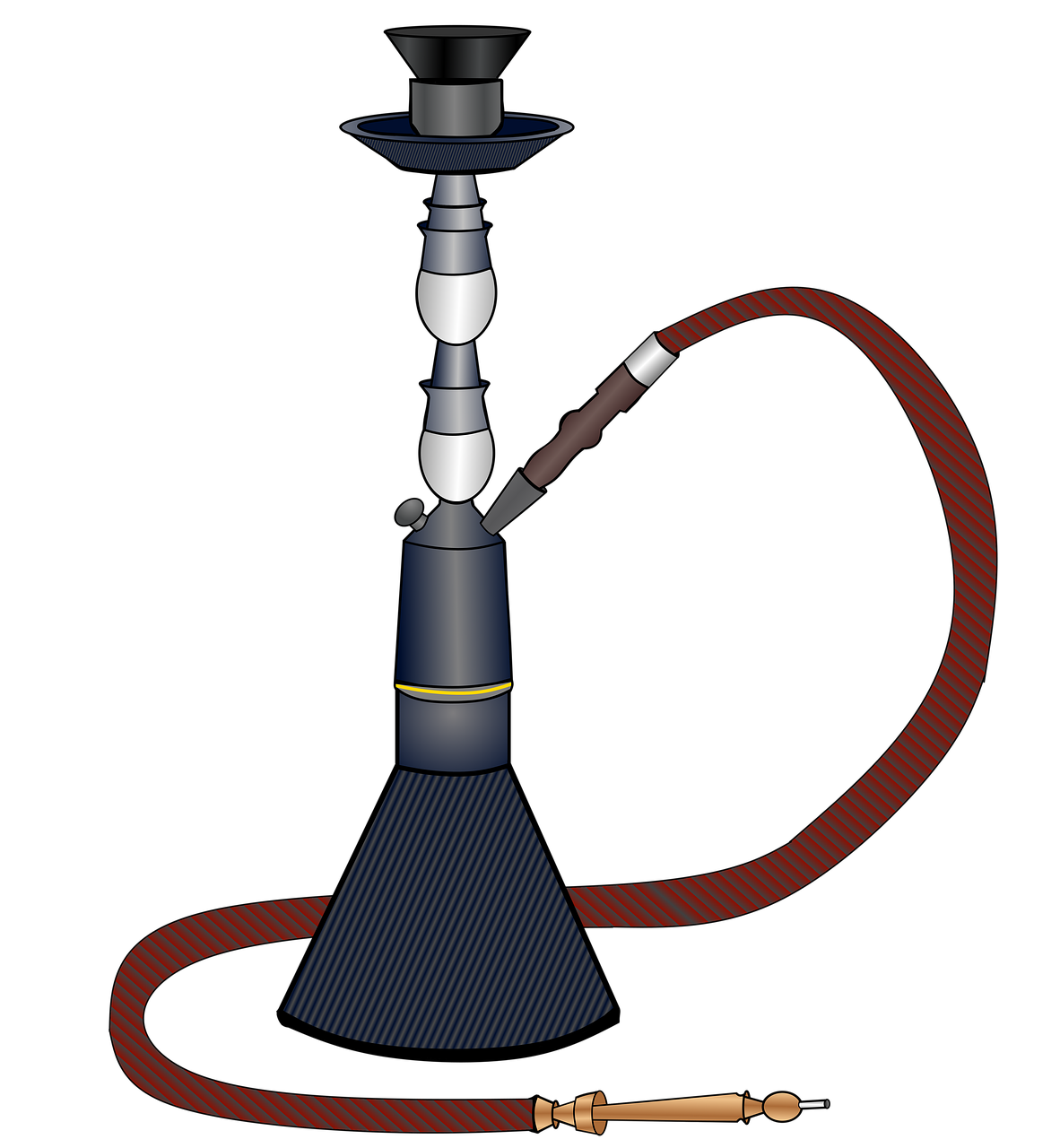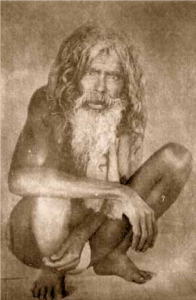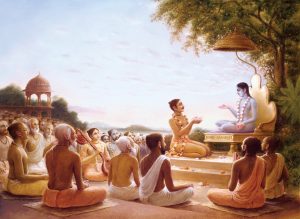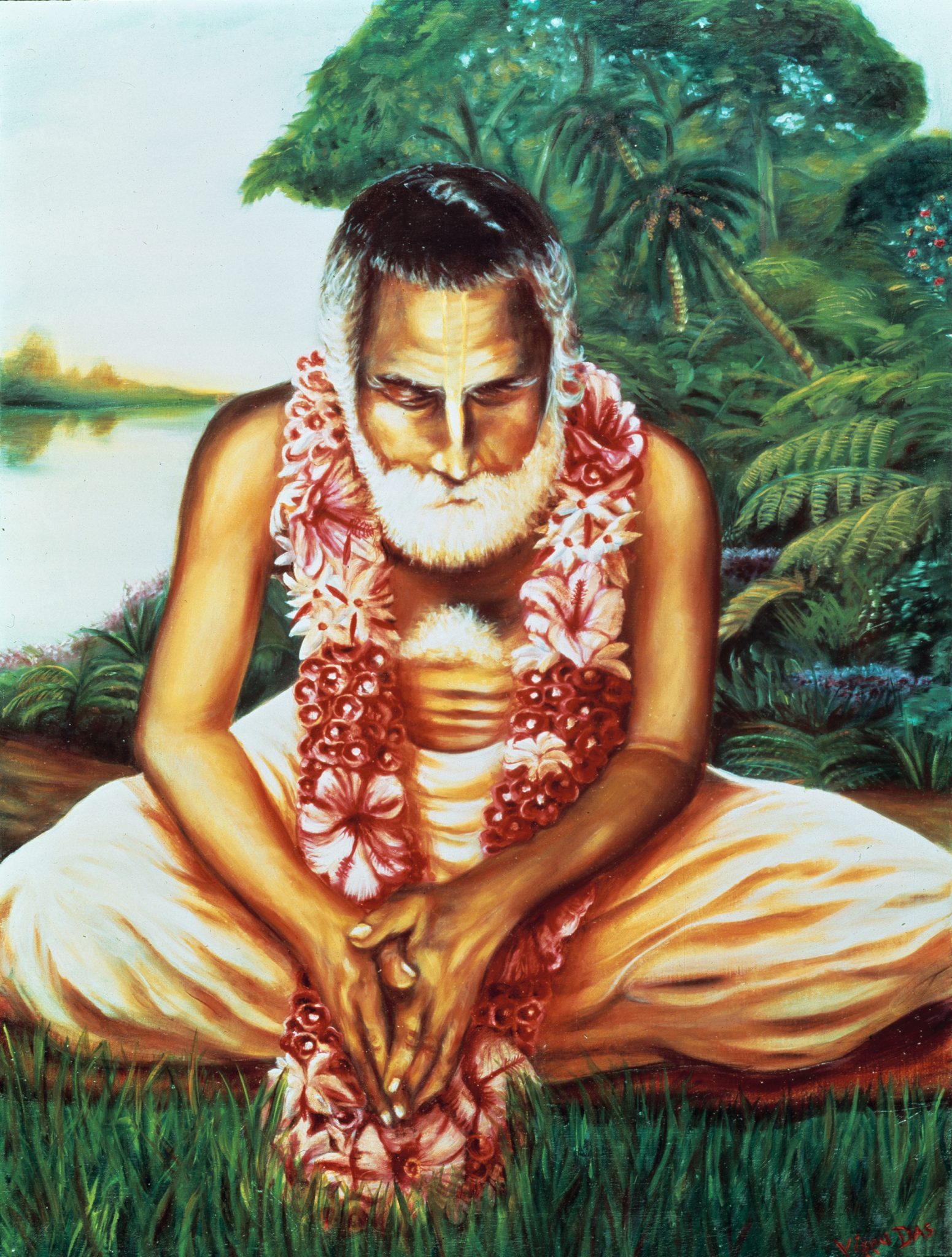
Excerpt from the book Ācārya Kesarī Śrī Śrīmad Bhakti Prajñāna Keśava Gosvāmī – His Life and Teachings, 2nd Edition by Śrīla Bhaktivedānta Nārāyaṇa Mahārāja (page 65)
In those days, bhajanānandī Śrīla Vaṁśīdāsa Bābājī Mahārāja was performing bhajana in a solitary place on the bank of the sacred Gaṅgā near Navadvīpa town in Koladvīpa. Bābājī Mahārāja was always absorbed in serving Śrī Śrī Rādhā-Govinda in his heart, with deep, transcendental emotion (bhāva-mayī sevā). He also performed bhāva-mayī sevā to his Śrī Śrī Gaura-Nityānanda deities, with whom he would sometimes have loving quarrels (prema-kalaha). It is extremely difficult even for prominent mahātmās to understand Śrīla Vaṁśīdāsa’s strange behaviour, which resulted from his inner bhāvas. Śrīla Sarasvatī Prabhupāda was acquainted with this mahātmā through Śrīla Bhaktivinoda Ṭhākura.
Śrīla Vaṁśīdāsa Bābājī Mahārāja used to chase away many people who came for his darśana, insulting them with abusive language. From time to time he would keep fish bones and other dirty things near his bhajana-kuṭīra  so that the public would think he was fallen. In this way he kept bad association at a distance. Such people were thus deprived of his darśana and pure hari-kathā, but he affectionately instructed the faithful who were inclined towards bhajana and averse to worldly things.
so that the public would think he was fallen. In this way he kept bad association at a distance. Such people were thus deprived of his darśana and pure hari-kathā, but he affectionately instructed the faithful who were inclined towards bhajana and averse to worldly things.
Once, Śrī Vinoda-bihārī Brahmacārī Kṛtiratna Prabhu went to the bhajana-kuṭīra of Śrī Bābājī, who seated Vinoda next to him with great respect. Śrī Bābājī had a special affection for the disciples of his intimate friend and best of godbrothers, Śrī Śrīmad Bhaktisiddhānta Sarasvatī Prabhupāda. Śrīpāda Kṛtiratna Prabhu noticed that Bābājī was frying eggplant on a griddle and turning the pieces over with his hand. When he asked Bābājī if a spatula should not be used, Bābājī gave the answer, “Let me see what Nitāī-Gaura are doing.” His renunciation and uncommon activities were very astonishing.
Sometimes, to deceive the public, Bābājī would prepare a hookah with tobacco, and say, “Today no fire, today no  tobacco.” Nonetheless, he used to keep the hookah in front of his Śrī Gaura-Nitāī deities and ask Them to make it prasāda. Then immediately he would get the answer and say, “My Gaura-Nitāī do not smoke tobacco.” It is extremely difficult for ordinary people to understand what kind of bhāva is arising and when, in the heart of a transcendental mahājana.
tobacco.” Nonetheless, he used to keep the hookah in front of his Śrī Gaura-Nitāī deities and ask Them to make it prasāda. Then immediately he would get the answer and say, “My Gaura-Nitāī do not smoke tobacco.” It is extremely difficult for ordinary people to understand what kind of bhāva is arising and when, in the heart of a transcendental mahājana.
One day Kṛtiratna Prabhu brought his intimate friend Śrī Narahari Prabhu to have darśana of Bābājī. They saw that the distribution of tea prasāda was going on. Śrī Kṛtiratna Prabhu told Śrī Narahari Prabhu, “If we take this prasāda, we will go to hell. Bābājī Mahārāja is like Nīlakaṇṭha Mahādeva (Lord Śiva); only he can digest this. We ordinary people will die if we take this. ‘Tejīyaṣāṁ na doṣāya vahneḥ sarvabhujo yathā.’* It is not advisable for common people to imitate mahāpuruṣas, who are endowed with transcendental power. Our duty is to constantly practise their instructions, which bring auspiciousness to the jīvas.”
Another day, Śrī Kṛtiratna Prabhu saw Bābājī Mahārāja in his bhajana-kuṭīra deeply absorbed in bhajana. Many  devotees who were taking his darśana were also offering donations, and one of them started to gather up the coins. Bābābjī at once scolded him, saying, “Tho, paisā tho. Jekhānakāra paisā sekhāna tho. Utpātera kauḍī citpāte jaya – Don’t touch the money. Leave it wherever it is. Corrupt money is the reason one falls down.” All the actions of a mahāpuruṣa are for the welfare of the world, and their instructions are extremely important for true practitioners of bhakti. Those who act in accordance with their instructions will gradually progress in bhajana. Their lives will become blissful and they will achieve perfection in their sādhana-bhajana.
devotees who were taking his darśana were also offering donations, and one of them started to gather up the coins. Bābābjī at once scolded him, saying, “Tho, paisā tho. Jekhānakāra paisā sekhāna tho. Utpātera kauḍī citpāte jaya – Don’t touch the money. Leave it wherever it is. Corrupt money is the reason one falls down.” All the actions of a mahāpuruṣa are for the welfare of the world, and their instructions are extremely important for true practitioners of bhakti. Those who act in accordance with their instructions will gradually progress in bhajana. Their lives will become blissful and they will achieve perfection in their sādhana-bhajana.
On one occasion, a new tridaṇḍī-sannyāsī arrived to take Bābājī’s darśana. Seeing him offering his praṇāma, Bābājī said, “Fresh bamboo wrapped in cloth does not constitute a daṇḍa, and one does not become a tridaṇḍī by holding it. The significance of carrying a tridaṇḍa is to utilize the body, mind and words completely in the service of Bhagavān.” The new sannyāsī was very simple and could extract the essence of the instruction. He became very happy when he heard Bābājī’s words and said: “Ki kāj sannyāse, mora prema–prayojana, dāsa kari’ vetana mora deha prema-dhana – What is the need of my sannyāsa? My goal is to achieve prema.  Please make me your servant and give me the wealth of prema as my salary.”
Please make me your servant and give me the wealth of prema as my salary.”
Another time, a few devotees came to Śrīla Bābājī Mahārāja for his darśana. They offered reverential greetings at his lotus feet, and with great respect started singing, ‘je ānila prema-dhana karuṇā pracura’, a song composed by Śrī Narottama dāsa Ṭhākura. At the end of the kīrtana they repeated the last lines again and again – ‘pāṣāṇe kuṭībo māthā, anale paśibo, gaurāṅga guṇera nidhi kothā gele pābo’. This viraha-kīrtana is filled with lamentation. The purport is as follows: “Where has Śacīnandana Śrī Gaurahari gone – He who, by His causeless mercy, freely and indiscriminately distributed here on earth kṛṣṇa-prema, which is difficult even for Brahmā, Śiva and others to attain? Where are His associates such as Śrīla Advaita Ācārya, Svarūpa Dāmodara, Rāya Rāmānanda, Śrī Rūpa and Śrī Raghunātha? Without them I cannot stay alive. Where will I go? Where will I obtain the dust from their lotus feet? If I cannot get their darśana, I will smash my head on a stone or enter into burning fire.” After hearing this kīrtana, Bābājī Mahārāja stood up and said, “You sang a song, only. Whose heart is torn apart? You have no idea of his heart. When the author wrote this kīrtana, he was deeply experiencing the pain of separation. Have you endeavoured to attain that? How can feelings of separation come before meeting? Has sambandha-jñāna appeared in your heart?”
It cannot be said whether or not the devotees performing the kīrtana understood the significance of Śrī Bābājī’s words, nevertheless, the purport of those words was sublime.
*Spiritually powerful personalities are not harmed by apparent moral transgression. They are like fire, which devours everything and remains pure (Śrīmad-Bhāgavatam 10.33.29)

Excerpt from the book Volcanic energy by Śrīla Bhakti Vijñāna Bhāratī Mahārāja (page 82)
After Śrīla Prabhupāda’s disappearance from this world, many of his renounced disciples who had dedicated their lives for his service used to gather every year on the day of Śrī Jagannātha mahotsava (the day after Śrī Gaura-pūrṇimā) at Śrī Caitanya Sarasvata Maṭha in Navadvīpa, which was established by Śrī Śrīmad Bhakti  Rakṣaka Śrīdhara Gosvāmī Mahārāja. On one such occasion, I had the good fortune of witnessing a most astonishing example of the highest ideal of Vaiṣṇava conduct.
Rakṣaka Śrīdhara Gosvāmī Mahārāja. On one such occasion, I had the good fortune of witnessing a most astonishing example of the highest ideal of Vaiṣṇava conduct.
After honouring mahāprasāda, all the Vaiṣṇavas went to take rest in their respective rooms in the maṭha. Śrīla Śrīdhara Gosvāmī Mahārāja, however, sat and rested on an easy chair outside his bhajana-kuṭīra while his sevaka, Śrī Bhakti Sundara Govinda Mahārāja, took Guru Mahārāja inside Śrīla Śrīdhara Gosvāmī Mahārāja’s bhajana-kuṭīra and requested him to take rest on Śrīla Śrīdhara Gosvāmī Mahārāja’s bed. Guru Mahārāja signaled Śrī Govinda Mahārāja to lay a mat and pillow on the floor nearby. He then lay down and rested on the mat, and not on Śrīla Śrīdhara Gosvāmī Mahārāja’s bed. Śrī Govinda Mahārāja told me, “The transcendental body of your Guru Mahārāja and his attractive face made it appear as if he was a manifestation of Bhagavān Himself.”
Later, Śrīla Śrīdhara Gosvāmī Mahārāja invited Guru Mahārāja to sit on his easy chair, but Guru Mahārāja declined. Śrīla Śrīdhara Gosvāmī Mahārāja said, “According to vara-varaṇanera nyāya—that is, the logic of a  groom on the day of his wedding—there is no fault if you accept my seat. Just as it is not considered disrespectful when a groom rides atop a mare during his wedding procession while his elders—like his father, grandfather, priests and other relatives—walk on foot, there would be no consideration of offense if you were to sit in my easy chair.
groom on the day of his wedding—there is no fault if you accept my seat. Just as it is not considered disrespectful when a groom rides atop a mare during his wedding procession while his elders—like his father, grandfather, priests and other relatives—walk on foot, there would be no consideration of offense if you were to sit in my easy chair.
“When Śrī Sukadeva Gosvāmī accepted an elevated seat in the presence of his father, Śrī Kṛṣṇa Dvaipāyana Vedavyāsa; his grandfather, Śrī Parāśara Muni; and great sages like Āṅgirā Ṛṣi and Bhāguri Ṛṣi in order to narrate Śrīmad-Bhagavatam to Parīkṣit Mahārāja, his act of sitting up high was completely free from any fault or offense. Similarly, there will be no fault or offense should you choose to accept a seat in my easy chair.”
Still, Guru Mahārāja did not accept the seat. He said, “The conduct of a groom and that of Śrī Śukadeva Gosvāmī is followed in the wake of some particular circumstance for the sake of service. Such conduct is not for general circumstances, and therefore it cannot be imbibed in one’s regular day-to-day conduct. Imitating such conduct without discrimination will definitely be considered an offense.” The etiquette and conduct Guru Mahārāja demonstrated in front of his senior godbrother was ideal and ought to be followed by everyone.

Excerpt from the book Viśuddha Caitanya-vāṇī by Śrīla Bhakti Vijñāna Bhāratī Mahārāja (page 113)
Imitation of the devotees of Bhagavān leads only to the deprivation of the Supreme Lord’s mercy, even if done with the intention to attain the Lord’s favour. In order to become qualified to receive His mercy, we must follow (anusaraṇa) in the footsteps of His dearest devotees, being always guided by their internal moods (pravṛtti) and personal conduct. Mere imitation of their external actions will not suffice.
Let us understand this with a story.
A person maintained his family by cutting and selling dry wood from the jungle. One day, he saw a dry tree on  the bank of a river, and began chopping the tree from its trunk. Soon after he started, the axe slipped from his hands and flew into the deep river. With a grave heart he thought, “I am in great trouble. My axe is now lost, and because I have no wood to sell, I will be unable to purchase rice, dhal and other necessities for my family. How can I go home empty-handed?” Being unable to conceive of a solution, he began weeping.
the bank of a river, and began chopping the tree from its trunk. Soon after he started, the axe slipped from his hands and flew into the deep river. With a grave heart he thought, “I am in great trouble. My axe is now lost, and because I have no wood to sell, I will be unable to purchase rice, dhal and other necessities for my family. How can I go home empty-handed?” Being unable to conceive of a solution, he began weeping.
Hearing his pitiful crying, the demigod of water, Śrī Varuṇa-deva, emerged from the river and asked the woodcutter the reason for his tears.
The woodcutter replied, “I was thinking that by felling this large tree and selling its wood, I would be able to comfortably maintain my family members for many days. I was overpowered by greed, and this contaminated  thinking led to my great misfortune. As a result, my only wealth—my axe—slipped from my hands and flew into this deep river. Because of its strong current, I am unable to enter its deep waters and retrieve my axe. Now I fear going home, as my children will be crying due to hunger. I see no solution to my misery.”
thinking led to my great misfortune. As a result, my only wealth—my axe—slipped from my hands and flew into this deep river. Because of its strong current, I am unable to enter its deep waters and retrieve my axe. Now I fear going home, as my children will be crying due to hunger. I see no solution to my misery.”
After hearing his words, Varuṇa-deva entered the water and re-appeared with a golden axe in one hand and silver axe in the other. He asked the woodcutter if either of the two axes were his. The woodcutter replied, “O Deva, neither is mine. How could I afford axes like these? I do not even have enough food at home to feed my children, so how could I ever possess axes made of gold or silver?”
Varuṇa-deva then re-entered the water and appeared with a golden axe in one hand and the woodcutter’s iron  axe in the other. He again asked the woodcutter if either of the axes belonged to him. The woodcutter replied, “The iron axe previously belonged to me, but because it is in your hands, it now belongs to you. If you were to mercifully give me back my axe, I would be able to cut and sell some wood and provide my family with the necessities they require.”
axe in the other. He again asked the woodcutter if either of the axes belonged to him. The woodcutter replied, “The iron axe previously belonged to me, but because it is in your hands, it now belongs to you. If you were to mercifully give me back my axe, I would be able to cut and sell some wood and provide my family with the necessities they require.”
Varuṇa-deva, being extremely pleased by the conduct of the woodcutter—who, though poor and needy, remained a truthful and honest follower of the path of dharma—gave him all three axes: the golden axe, the silver axe and the iron axe. He told the woodcutter, “Because it is late, there is no need for you to cut and sell wood today. Go to a jeweller, sell some of the gold and silver from these axes, buy rice, dhal, salt and whatever other necessities your family requires, and then quickly take them to your home. But do not tell anyone about what transpired here today.”
After the woodcutter followed Varuṇa-deva’s instructions, he returned home with all the necessary items. His family members were very pleased to see him with so many things. The woodcutter easily maintained his family for about two months by selling just a small bit of those valuable axes.
When the woodcutter’s wife would go to a nearby pond to wash pots, she would meet with the other neighbourhood ladies and engage in casual conversation. One day, a neighbour’s wife mentioned to her, “We  have seen that your husband no longer goes to the jungle to cut wood, but still your family eats and lives well. It also seems that you are buying many household items. How is this possible? Do you now have some other means of income?”
have seen that your husband no longer goes to the jungle to cut wood, but still your family eats and lives well. It also seems that you are buying many household items. How is this possible? Do you now have some other means of income?”
Although the woodcutter had explicitly told his wife that Varuṇa-deva had instructed him not to disclose to anyone the secret of his gift, she could not resist telling the neighbour’s wife. After disclosing her husband’s secret, she told the neighbor’s wife not to tell this secret to anyone, because her husband would be furious if he were to know she had ignored his request not to tell anyone. The neighbour’s wife, however, was unable to refrain from relating such an extraordinary incident to her husband, who also was a woodcutter.
After hearing about Varuṇa-deva’s mercy, the neighbour woodcutter arose very early the next morning and quickly went to the same river with his axe. There, he began acting as if he was trying hard to fell the dry tree, and then purposefully threw his axe in the river, at which time he pretended to loudly cry. Hearing his crying, Varuṇa-deva emerged from the water and inquired about the reason for his weeping. After hearing everything from him, Varuṇa-deva entered the water and came out with silver and iron axes in his hands. He then asked the woodcutter if either of the axes belonged to him. The woodcutter indicated that the silver axe was his.
Varuṇa-deva then re-entered the water and appeared with the iron and golden axes in his hands. He again  asked the woodcutter if either of the axes belonged to him. The woodcutter indicated that the golden axe was his. Hearing the woodcutter’s deceitful words, Varuna-deva disappeared into the water, taking with him the golden axe, the silver axe, and even the woodcutter’s iron axe, and never returned again.
asked the woodcutter if either of the axes belonged to him. The woodcutter indicated that the golden axe was his. Hearing the woodcutter’s deceitful words, Varuna-deva disappeared into the water, taking with him the golden axe, the silver axe, and even the woodcutter’s iron axe, and never returned again.
The first woodcutter was simple, honest, truthful, non-duplicitous and a sincere follower of the path of dharma, and as a result, he received the mercy of Varuṇa-deva, who gave him not only his own iron axe, but also the golden and silver axes. The second woodcutter was a dishonest, duplicitous and untruthful cheat who neglected the path of dharma. Although he externally performed the same activities as the first woodcutter, because of his conduct, he was deprived not only of the mercy of Varuṇa-deva, but of his own iron axe—his only wealth—as well.
In the same manner, a person who is non-duplicitous, completely free from the desire to attain dharma (religiosity), artha (wealth), kāma (sense gratification) and mokṣa (liberation), and wishes only to render pure loving devotional service to Bhagavān, becomes the recipient of His divine mercy, and his life becomes successful. On the other hand, he who externally engages in the same service as the devotees, while remaining duplicitous at heart and internally harbouring the desire to attain dharma, artha, kāma and mokṣa, finds himself deprived of Bhagavān’s true mercy.
A person who observes the same limbs of bhakti—like śravaṇa and kīrtana—as the pure devotees, but does so only externally without following the inner moods inherent in sincere service, remains deprived of their true benefit; the deep meanings of the scriptures as described by śrī guru and Vaiṣṇavas, as well as the essence of their divine instructions, do not manifest in his heart. Moreover, he loses the balance of his previously accumulated sukṛti (spiritual pious activities). As a result of performing śravaṇa, kīrtana and the other limbs of bhakti with an offensive mentality, he attains only objects of material enjoyment, and thereby makes his life even more miserable than before.

Excerpt from the Introduction of the book Affection and Reproach: The Synthesis of Love, Q&A with Śrīla Bhakti Vijñāna Bhāratī Mahārāja (page 7)
One day, one of Śrī Śrīmad Bhaktivedānta Nārāyaṇa Gosvāmī Mahārāja’s earlier disciples posed a question to Śrīla Mahārāja:
“We repeatedly hear that even if a brahmacārī or sannyāsī disciple of our gurudeva had committed a grave transgression, Śrīla Gurudeva would never ask that person to leave the maṭha, despite any consequential outcry. Now, during his unmanifest pastimes, there are many devious individuals who resort to indolence, seek privileges or try to enjoy Śrīla Gurudeva’s assets and facilities. Such persons simply waste their time. If a senior devotee or maṭha in-charge notices them commit a major transgression and reproaches them in a disciplinary tone—As a resident of the maṭha, you should not act like this. Such behaviour is unacceptable, and if it persists, we can no longer accommodate you in this maṭha—the offender protests and immediately refers to Śrīla Gurudeva’s above-mentioned stance. With the objective of gratifying their enjoying propensity, they retort, ‘The conduct of the present generation of maṭha authorities differs vastly from that of Śrīla Gurudeva. We will surely oppose any authorities who defy us like this.’
“Are we truly at fault for taking a stance of admonishment? We have heard that like our Śrīla Gurudeva, Śrīla Bhakti Vallabha Tīrtha Gosvāmī Mahārāja would never chastise even the most reprobate individuals. Please tell us, how should we conduct ourselves?”
Śrīla Mahārāja replied, “Śrī Bhaktivedanta Nārāyaṇa Mahārāja and Śrī Bhakti Vallabha Tīrtha Mahārāja are both bona fide Vaiṣṇavas. I do not wish to comment on their conduct, as I am unaware of their implicit motive. Having said that, I can certainly assert that the practice of a guru admonishing his disciple has prevailed since ancient times. If any bona fide personality, impelled by some idiosyncrasy, differs in behaviour from the established path,  then such an act cannot be considered conventional and should not be emulated. For instance, upon being pleased with someone, Śrī Mīnaketana Rāmadāsa would climb atop his shoulders, whereas Śrī Abhirāma Ṭhākura would lash him with his whip. Śrīla Gaura-kiśora dāsa Bābājī Mahārāja used to chant harināma while sitting in a public lavatory. The behaviour of such venerable Vaiṣṇavas is not imitable.”
then such an act cannot be considered conventional and should not be emulated. For instance, upon being pleased with someone, Śrī Mīnaketana Rāmadāsa would climb atop his shoulders, whereas Śrī Abhirāma Ṭhākura would lash him with his whip. Śrīla Gaura-kiśora dāsa Bābājī Mahārāja used to chant harināma while sitting in a public lavatory. The behaviour of such venerable Vaiṣṇavas is not imitable.”
He continued, “Guru Mahārāja would always assert, ‘A place where people reside together becomes chaotic in the absence of the imposition of a framework of rules.’ Various disruptions are bound to manifest without the enforcement guide. It is therefore auspicious for everyone to remain subservient to any ordinances that pertain to them, and it is imperative to penalize those who transgress the law of the land. There is not a single gentleman anywhere who supports corruption or unscrupulous behaviour.’
“It is quite evident from Guru Mahārāja’s many letters that a person who is unable or unwilling to conduct his life according to the rules of the maṭha must not be granted residence there. And regarding the authorities of the maṭha, it should be known that meting out chastisement befits others only when the admonisher knows how to be affectionate.”
After giving this response, Śrīla Mahārāja retired to his room, where he continued speaking to his servants: “The era of extreme independence has arrived. Not only are people disinclined to follow the words of others, they are reluctant to heed the commands of their own guru. Although this was not the case during Guru Mahārāja’s time, insubordination still persisted, and so he was occasionally forced to adopt a firm stance and even dole out chastisement. In my opinion, it would be an invaluable service to preserve what few of his written letters remain and make them available for the faithful to closely study. I cannot do anything to change the current state of the world, nor can I monitor the extent to which devotees are capable of following or what deeds they actually perform. But I can at least present to them the ideals of our guru-varga. So, it would be quite fine if anyone were to effectuate this.”
Image/Art made possible by Pixabay.com & Krishnapath.org








